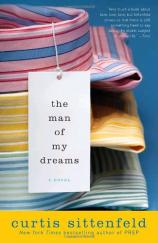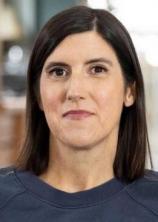The Man of My Dreams
Review
The Man of My Dreams
Bestselling author Curtis Sittenfeld is no stranger to the nuances of female angst. In her sleeper hit, PREP, she captured the praise of critics and the attention of squirming audiences nationwide with her on-target portrayal of teenage torment. Lee Fiora, PREP's 14-year-old protagonist, wasn't just a passive participant of the elite boarding school experience; she was the poster child for all things freakishly (yet frighteningly commonplace) adolescent --- insecurity, competition, carefully masked innocence. We were drawn to her day-to-day fumblings as mirror images of our own and felt relieved when we could close the book and leave all the uncomfortable parallels behind as mere recordings of battles once fought and, thankfully, overcome.
In the follow-up to this New York Times bestselling debut, Sittenfeld once again sets her sights on dissecting the meat of uncomfortably existing in one's own skin --- this time, while on the bumpy road to "adulthood," i.e. age 30. While Hannah Gavener, her latest protagonist, first appears in the novel at the not-so-tender age of 14, she does manage to make it past her middle and high school years to college and beyond into "real life" carrying, of course, her fair share of baggage.
At 14, Hannah appears to be like many girls her age --- uncomfortable with her appearance, slightly jealous of her older (read: beautiful and more sophisticated) sister, and preoccupied with the "idea" of things, i.e. the "idea" of what it means to have a boyfriend, the "idea" of what's cool and what's lame, the "idea" of what a healthy family should be and the fact that she isn't growing up in one, and so on. What sets her apart from the luckier ones, but certainly not from the majority, is that she is exceptionally critical of herself and of her surroundings --- a quality that she will carry with her into her adult years. "On a daily basis, Hannah will not feel markedly different from the way she felt when she was fourteen...Being raised in an unstable household makes you understand that the world doesn't exist to accommodate you...you have never believed you live under the shelter of some essential benevolence."
Despite this admittance early on, it is clear that the aging Hannah, while saying that the world doesn't owe her contentment, still (possibly subconsciously) believes she might find that ultimate filler that (or, more appropriately, who) would make her feel complete --- yet one would never suspect this of her due to her almost unbearable self-deprecating and overtly critical behavior. In college, she plunders through her four years with the requisite amount of studying and seems to have fun occasionally, although one gets the feeling that this so-called fun is her pained way of trying to convince herself that she's normal. She forgoes the mating dance that so many of her peers indulge in, and fails to date or have sex until her first serious relationship with a doting boy named Mike. Incidentally, nice Mike just might have been perfect for her --- save the fact that in her mind, he liked her too much and nice boys just aren't that interesting.
So a few years pass and the ever-neurotic Hannah finds herself in two more relationships --- one, with a hot skirt-chaser from New Zealand named Oliver (her office-mate), and the other, a "friendship" with her cousin's ex-boyfriend, Henry, the man she moves to Chicago for and whom she's been lusting after for years. It goes without saying that her open relationship with Oliver is a bust --- his frequent infidelities (approved by Hannah, mind you) are downright nauseating and make Hannah look pathetic --- and her non-relationship relationship with Henry is just as detrimental to Hannah's confidence, if not more so. If the ultimate filler is truly what she's looking for, she's no closer to finding it/him than she was at age 14, and seems weirdly resigned to that fact. "I feel like a lot of life is distasteful and embarrassing. And you just push through it...You fix what you can, and you let time pass."
At the novel's conclusion, 28-year-old Hannah reports to having moved into a new phase. She is living in New Mexico, working as a teacher at a school for autistic boys, and seems to have gained a new, less me-centric lease on life. In a letter to her long-ago therapist, she writes "I moved on; I progressed. During the time we met, I must have seemed so stuck --- in my ideas of myself, of men, of everything...but all along, I was listening to you; I was learning. And I am learning still."
Clearly, THE MAN OF MY DREAMS is a hyper-conscious reading experience, and one certainly emblematic of our self-obsessed, overly diagnostic society. Hannah's character is acutely aware of her own and others' inadequacies and her incessant circumstantial dissections might be too prickly for those who would rather leave that unstable phase of life behind. Nonetheless, Sittenfeld is making a name for herself as a master of this domain and her latest novel far from disappoints.
Reviewed by Alexis Burling on April 10, 2007
The Man of My Dreams
- Publication Date: April 10, 2007
- Genres: Fiction
- Paperback: 285 pages
- Publisher: Random House Trade Paperbacks
- ISBN-10: 0812975391
- ISBN-13: 9780812975390





